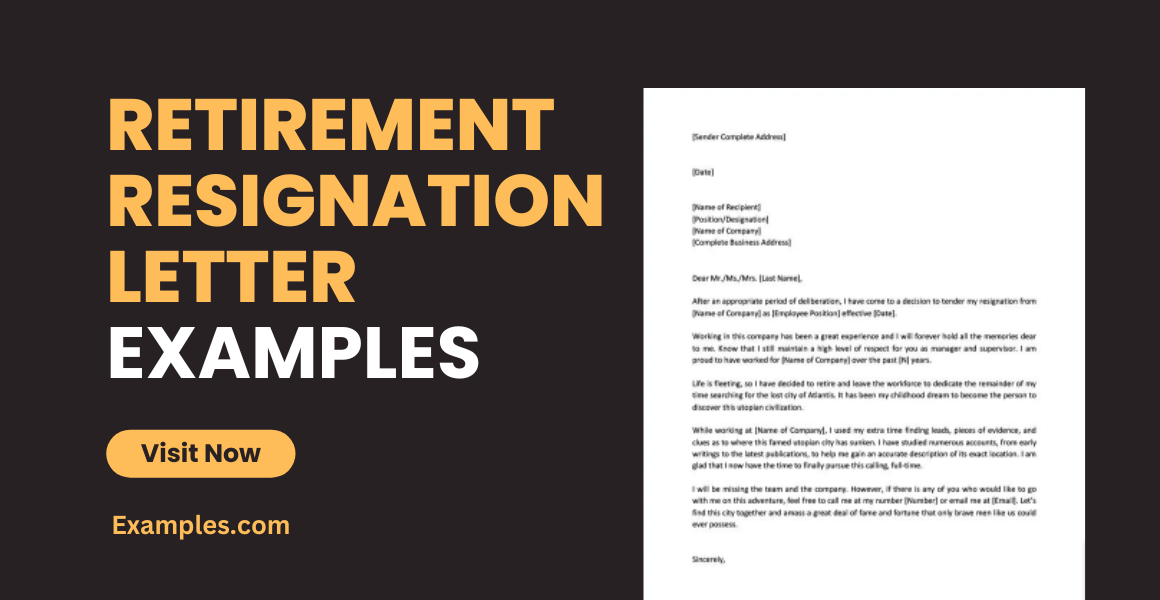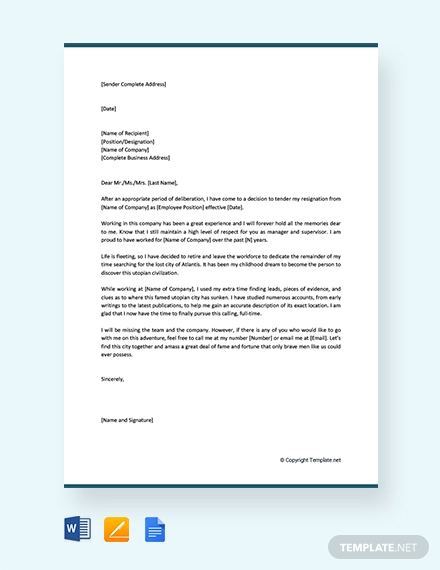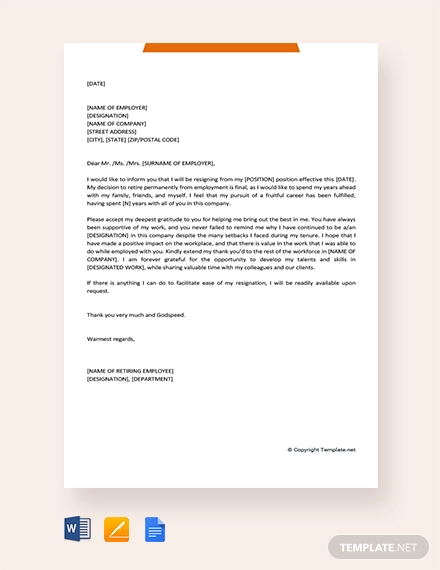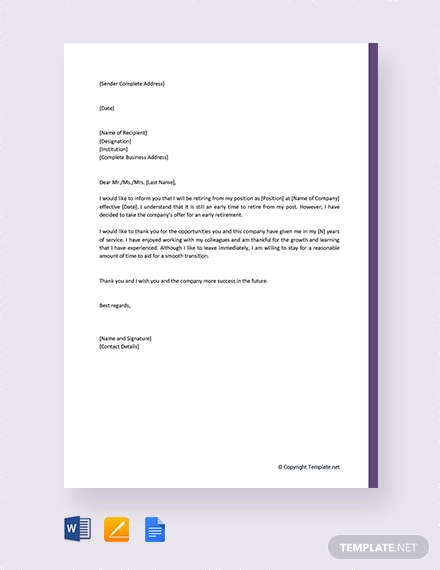Retirement Resignation Letter Example [Edit & Download]
Retiring from your job is a huge decision to make. Retiring means you are of the right age to stop working. As they say, “The trouble with retirement is that you never get a day off.” For some retiring means you get to travel all the places you have yet to visit, fully enjoy the hobbies you have recently started or simply just relaxing and freeing yourself from all the stresses working a nine to five job brings. You may also see resignation checklists.
Although you have no intention of working again, leaving and retiring from your current job in a positive note is still the best way to go. Remember that you are leaving a position with years of experience on your shoulder, and that position may not be easy to fill. Before retiring, give your employer advance notice and personally discuss your plans with your supervisor before sending in your letter. You may also see Retirement Speech Examples.

Here are Some Examples of Retirement Resignation Letters:
Free Funny Retirement Resignation Letter
Free Retirement Resignation Letter to Employer
Free Early Retirement Resignation Letter
Notice of Retirement
As mentioned above, it is best to discuss your plans for resignation with your employer before handing in your official retirement resignation letter. The notice will give your employer ample amount of time to decide what to do with the loss that your retirement brings to the company. Here are a few tips on how to give notice of retirement to your employer:
Read your contract
Before you decide to retire, you must familiarize the company’s retirement policies and retirement packages. This will help you deal with the process smoothly.
Notify months in advance
While you probably don’t want to inform your employer of your retirement months in advance, you have to. You owe it to them to at least let them find a replacement before you retire from your position. You may also see resignation email examples
Help during the transition
Offer a hand during the transition. Your experience and expertise in the position will surely help with the training of the new employee.
Be professional and gracious
Be it resigning or retiring for good, always leave on a positive note. Thank your employer for the opportunities and experiences. Avoid sharing any negative experiences as it is not the right time to discuss. You may also see job resignation letters.
Follow up in writing
After personally giving notice of retirement and discussing your plans with your employer, follow with a written notice of retirement to make things official.

What to Write in your Retirement Resignation Letter
For the first part of your letter, mention the specific date you wish to retire. This will help you and your employer to avoid putting off your retirement. Assuming that you have become an asset to the company after years of working for them, offer to help with the transition with the new employee. Your expertise in the position will help smoothen out your retirement process. This also means the company will less likely call you during your retirement to ask how to do the responsibilities your position entails. You may also see official resignation letter.
Mention your accomplishments while with the company. Briefly discuss the impact you have added to the company over the years. At the very least, mention the number of years you have worked for the company. This way your employer will be reminded of your contributions to the company’s success.
Express gratitude to the company after how many years of working for them. Thank your employer for the experiences and opportunities you have achieved while working for them. You can also offer a proposal for your employer after your retirement. Say your after your face-to-face discussion and employer still wants you work as a part-time consultant for the company, mention your interest with the offered position. You may also see two weeks notice letter.
If the company still has concerns with your position, provide your contact information. Especially when you abruptly want to retire or you plan on going on a long-term vacation on your retirement, your contact information will help your employer to keep in touch with you. You may also see Resume Outline Guidelines & Examples
The letter serves as a formal communication regarding your retirement, therefore, it should be written in a business letter format. The tone of your letter should be professional and cordial. Maintain a respectful tone to your letter and avoid lengthy explanations. You may also see temporary job resignation letter
Retirement Resignation Letter Example
Kate Adams
9656 Crown Avenue
Covington, Ky 41016
Tel: (555)555-5555
To:
Daniel T. Smith
Manager, HR
Wilcon Marketing Inc.,
5 East Oak Meadow St.,
Scotsville, KY 42164
January 31, 2015
Dear Mr. Smith,
This letter is to inform you of my upcoming resignation from Wilcon Marketing Inc. due to my retirement. Please accept this letter as my two weeks’ notice, my resignation will take place on February 15, 2015.
For the meantime, I will continue to work on my projects as usual while training my replacement. I am beyond grateful to have been a part of the Wilcon Marketing Inc. team for over 10 years and have enjoyed the many positive experiences. I intend to do all that I can to help make this transition happen as smoothly as possible.
Feel free to contact me during daytime hours regarding your concerns. If my assistance is needed in any way, I have informed my team members and replacement to notify me. My telephone number is (555)555-5555 and my email address is [email] I hope to hear from you in the near future.
Working at Wilcon Marketing Inc. for 10.5 years has meant a great deal to me. I will miss the whole team and the positive working environment. I sincerely hope nothing but the best for the Wilcon Marketing Inc. team. I hope for its continued to growth and successes in the industry. I thank you for your cooperation regarding this matter.
Yours sincerely,
Kate Adams
Assistant Manager
Wilcon Marketing Inc.

What Not to Include in Your Retirement Resignation Letter
Your criticism for the company has no place in your retirement letter. Even if your opinions about the company are valid, it is best to avoid them in your letter. Your negative comments and experiences with your colleagues and the management should be avoided as well. There is no point in burning bridges you have spent too much time in building. It is better to leave the position in a professional way. You may also see Dos and Donts for Quitting your Job
Overly-emotional sentiments and exaggerations are irrelevant to your letter. Although you might miss your colleagues and working environment, allotting a whole paragraph for your sentiments of regret and grief is no longer needed in your letter. One or two sentences is enough to express your sentiments. You may also see resignation notices.
Showing immaturity through unnecessary complaints will only leave a negative mark on your name in the company. Watch the tone of your words in order to avoid conflict and disagreement on your last few days on the job. You may also see resignation letters.
Sharing irrelevant details about your plans for retirement should not be included in your letter. Frankly speaking, your employer has no business with your future plans. If during your face-to-face conversation, your employer asks for your future plans, politely tell them without divulging unnecessary information.
Always proofread your letter before submitting. Avoid misspellings and grammatical errors. This may show that you have put no thought to your letter and that you look forward to leaving the company. It can be interpreted as your lack interest and dislike with the company. Also see Work Goals Examples

A retirement letter is your last chance to express gratitude to your employer for the years they have helped you grow. This your last chance to make a long-lasting impression and display your professionalism. Aim to leave and achieve an amicable agreement with your employer on your retirement. Always show respectfulness and maturity to the company that has helped shape the best version of yourself. You may also see short notices.
You can avoid any form of hassle from your previous job if you follow these steps. Always inform your employer in advance and professionally handle all the matters that concerns your retirement. Remember that you have worked hard to earn that badge of respect and abruptly retiring without any form of notice will tarnish your reputation. Always aim for an amicable and positive exit from the job you have spent a decent part of your life with.





